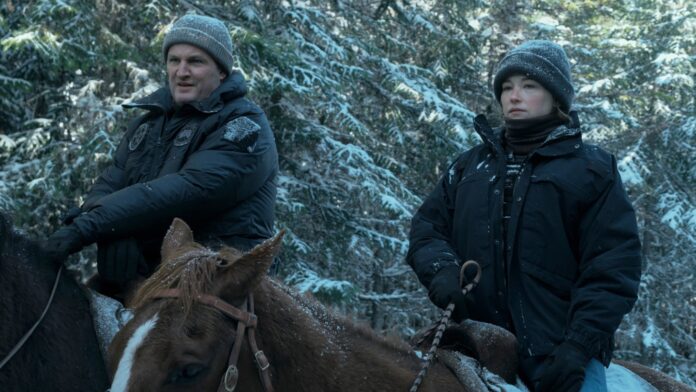It’s hard to give a basic description of Apple TV+‘s The Last Frontier that doesn’t make it sound like a helluva good time.
It’s Con Air, if the plane of inmates crash-landed in Alaska!
The Last Frontier
The Bottom Line
Turns what should be thrilling into a slog.
Airdate: Friday, October 10 (Apple TV+)
Cast: Jason Clarke, Haley Bennett, Dominic Cooper, Simone Kessell, Tait Blum, Dallas Goldtooth, Alfre Woodard
Creators: Jon Bokenkamp and Richard D’Ovidio
It’s Yellowjackets, with convicts instead of high-school soccer players!
It’s the sort of high-concept, heavily serialized procedural that NBC has been trying and failing to make since The Blacklist concluded its run — which makes sense because it comes from the creator of The Blacklist!
In a television landscape absolutely parched for escapism, The Last Frontier sounds like a recipe for fun.
The only problem is that after a pilot that hints at dozens of ways that The Last Frontier could be an adrenalized thrill ride — a vaccination against the avalanche of self-important serial killer dramas forcing your friendly neighborhood television critic to consider Prozac — The Last Frontier turns out not to be very much fun at all.
It’s the very opposite of fast-moving, a lumbering and padded journey that stretches two hours of story across 10 hours bogged down in over-telegraphed twists, hollow military jargon and insufferable domestic melodrama, squandering most of the entertainment value of its premise and leaving most of its overqualified cast in the lurch.
I very nearly checked out on The Last Frontier after the seventh episode began with a hideously unearned emotional kick in the groin — but I’m glad I stuck with it if only for the 30-minute stretch in which the same sub-par car-flipping stunt (or CG effect) is utilized multiple times with, like everything else here, diminishing results.
Look, The Last Frontier starts off fine.
Created by Jon Bokenkamp and Richard D’Ovidio, the show begins with prisoners on a plane. Some of them — Johnny Knoxville, Clifton Collins Jr. (or characters played by them) — are immediately recognizable. One of them, the Cyrus the Virus of the group, is paraded to the back of the vessel under heavy guard, with a hood over his head.
The plane goes up and then, just as quickly, goes down. There are explosions and a crash, and if none of the special effects are very good, it’s television, so you hold effects to a lower standard. Which I ceased to be able to do by midway through, because the effects in The Last Frontier are weak by any standard, and the series, after a while, contains no action scenes that aren’t dominated by those weak effects.
Apparently the crash landing is in Alaska, because we quickly meet U.S. Marshal Frank Remnick (Jason Clarke), and he, out for his morning run, quickly meets a moose. (“Will mooses ever appear again in the series?” “Meese?” “Moose?” “Whatever.” “No. There will be no more meese, but at least you know we’re in Alaska, even though the show was filmed in Quebec, mostly, and doesn’t feel like Alaska at all.”)
Anyway, Frank has a wife named EventualAbductee (Simone Kessell) and a teen son named EventualAbducteeToo (Tait Blum), and is on the verge of retiring, which is always a good sign. He’s also harboring a secret, and part of why I stuck with the show even through the seventh episode was because the exact nature of the secret was the only mystery I was still curious about.
Because the plane was a prisoner transport, it falls under U.S. Marshal jurisdiction, but because of the guy in the hood whose name isn’t Cyrus the Virus, the CIA has a very specific interest in the crash and the 18 missing inmates who survived but aren’t accounted for. Agency big-wig Bradford (Alfre Woodard) reluctantly summons Sidney (Haley Bennett), an agent with Daddy issues and one of those drinking problems that TV shows like to reveal by having characters show up drunk to a niece or nephew’s birthday party, as if that’s the best way of articulating “rock bottom.”
Sidney — no, it’s not a good idea to name your spy with Daddy issues “Sidney” as long as Alias is still available to stream — has a connection with the guy in the hood whose name isn’t Cyrus the Virus, but is “Havlock.” Bradford sends her off to Alaska, instructing her on how to manipulate Frank, who everybody assumes is a rube. He’s not.
So the way I figure it, there are two ideal ways that the plot for The Last Frontier could unfold. It could be a two-hour movie, probably starring Liam Neeson as Frank because at this stage in his career, kicking ass in the snow is what Liam Neeson does best (or most). Or it could be a broadcast-style series in which each episode finds Frank and Sidney working together to capture a different orange-clad killer, this being basically the plot of The Blacklist and The Hunting Party and a dozen NBC dramas in-between.
Clearly, The Last Frontier isn’t going to be the former, but it isn’t really the latter either. Even when the prisoners are played by various recognizable guest stars, nothing they’re doing and nothing in their apprehension is all that entertaining and The Last Frontier commits the cardinal sin of still being self-important about it.
This is the sort of show that absolutely must be fast-moving and efficient, but episodes of The Last Frontier are anything but. I was tolerant of the pilot being 60 minutes because it has a lot of exposition to work its way through, as well as building up to a climactic twist that every single audience member will have anticipated but is still treated like it’s mind-blowing. Every. Single. Audience. Member. (The twist at the end of the seventh episode will only be anticipated by 85 percent of viewers, I’m guessing.)
Subsequent episodes are still almost all between 55 minutes and an hour when they ought to be a broadcast-friendly 40 minutes, because nothing is gained from the extra time. The stuff with Frank’s wife and son, both abducted at different points and by different people, is deadly. The flashbacks showing Sidney’s connection to Havlock (the only actor in the main cast who I haven’t mentioned yet … try to be surprised) are deadly. Each procedural plot with the different escaped convicts is deadly, and by the second half of the season, the writers start making a joke out of how easily and blandly they’re being stopped.
Unfortunately, what’s most deadly is the show’s serialized mythology, a Russian nesting doll of MacGuffins with names like Archive Six, the Atwater Protocol and XenoGate. It all involves various covert government programs and surveillance state mumbo jumbo, but other than making me nod and say, “Well that sounds bad,” none of it makes any sense at all. When I say that I don’t understand the origins or motivations of the Havlock character in the slightest, I’m not exaggerating. Not an iota. And the actor playing the part (again, the only actor from the main cast whom I haven’t mentioned because I’m avoiding spoiling a twist that absolutely will not surprise you) can’t figure out how to play Havlock in any way.
A lot of what’s dull about The Last Frontier could be fixed with aggressive trimming of storylines and the inclusion of set pieces that are actually propulsive. There’s a scene in which a vehicle is dangling over a chasm in which everything looks so fake that when a character falls what appears to be hundreds of feet into said chasm and then, the next scene, is alive and perfectly healthy with no explanation, I didn’t even try to figure out the logic other than “A CGI fall can’t kill a CGI person.” There is one scene in which characters get to ride horses, and it’s a good idea that goes nowhere — ditto a lone dog-sledding scene.
The performances range from “mumbly and glum” (Clarke) to “generally glum” (Bennett) to “wasted” (Knoxville) to “not quite wasted but purposeless” (Collins). In a career in which she has too often been asked to breathe effortless authority into otherwise underwritten roles, Woodard may have her most underwritten role to date (though she does some things in the finale).
Most disappointing is the woeful underuse of Dallas Goldtooth, Indigenous writer-producer best known as William Knifeman from Reservation Dogs. Goldtooth is playing one of Frank’s fellow marshals, but his part simply alternates between scenes in which he spots a glum Frank and asks “What’s wrong, boss?” and scenes in which he conveys snippets of wisdom moored by almost nothing since The Last Frontier has no insight into the white or Native communities (the one featured village is treated like an anonymous infirmary) of Alaska.
The pilot and finale end up being the only episodes of The Last Frontier I’d recommend, the only episodes with the spark of creativity to match the enjoyable premise. The finale sets up a second season, but this for me was my last Frontier.
For more information follow us on our website




